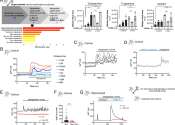New blood biomarker can predict if cognitively healthy elderly will develop Alzheimer's disease
Why do some people develop Alzheimer's disease while others don't? And, even more puzzlingly, why do many individuals whose brains are chock-full of toxic amyloid aggregates—a telltale sign of Alzheimer's brain pathology—never ...
May 29, 2023
0
141









